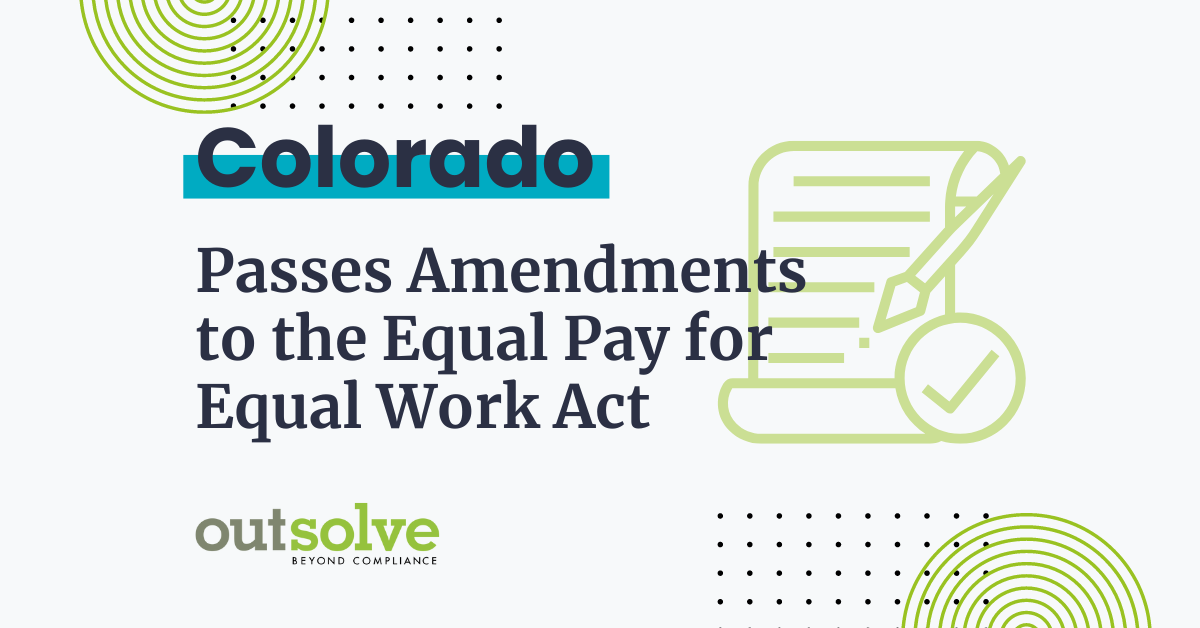2 min read
Colorado Passes Amendments to the Equal Pay for Equal Work Act
 Debra Milstein Gardner
:
Jun 9, 2023 1:50:38 PM
Debra Milstein Gardner
:
Jun 9, 2023 1:50:38 PM

The Ensure Equal Pay for Equal Work Act further defines and clarifies the difference between career progression and job opportunities.
Colorado’s Equal Pay for Equal Work Act (EPEW) became effective on January 1, 2021. As previously reported, the act is aimed at closing pay gaps for employees and requires employers, with operations or employees working in the state, to issue compensation ranges for all internal and external job postings. The act contains provisions regarding gender-based wage discrimination claims, pay transparency and opportunities for advancement and promotion. Soon after passing, the Colorado Department of Labor and Employment enacted the Equal Pay Transparency Rule (EPT Rule) to help explain the provisions of the act. Following the issuance of the EPT Rule, concerns were raised about ambiguities in the law and compliance issues specifically around the definition of a promotion and when announcements were required.
SB23-105, Ensure Equal Pay for Equal Work, passed during the 2023 legislative session. The new act amends the EPEW and clarifies the difference between “career progression” versus "job opportunity.” It is expected to be signed by Governor Polis and will become effective on January 1, 2024. Rules will be promoted to enforce the act no later than July 1, 2024.
Definitions
“Career development” is defined as a “change to an employee’s terms of compensation, benefits, full-time or part-time status, duties, or access to further advancement in order to update the employee’s job title or compensate the employee to reflect work performed or contributions already made by the employee.”
“Career progression” means “a regular or automatic movement from one position to another based on time in a specific role or other objective metrics.”
“Job opportunity” is defined as “a current or anticipated vacancy for which the employer is considering a candidate or candidates or interviewing a candidate or candidates or that the employer externally posts.”
Career progression applies to existing employees compared to job opportunity which refers to a current or anticipated vacancy to be filled. It does not address remote jobs. According to the Women’s Foundation of Colorado, “excluding remote workers from the protections of the Equal Pay for Equal Work Act would negatively impact a valued and critical part of our workforce.”
It states that employers do not need to announce (with pay and benefit information) “Career Development” and “Career Progression” opportunities.
Summary of Amendments
- Employers physically located outside of Colorado with fewer than 15 remote workers in Colorado need to provide notice of remote job opportunities through July 1, 2029.
- The “lookback” period for wage discrimination claims increased from three to six years. The “lookback” is not a statute of limitations and does not change the original law which provides a claimant to file in court within two years or lose their right to assert a claim. However, if the claimant files a timely claim, then the employee can recover damages for the previous six years.
- Employers must announce an employee’s promotion to a position which qualifies as a “promotional opportunity” within 30 days of the promotion. The information must include:
- Name of the promoted individual
- Former job title
- New job title
- Information on how other employees may demonstrate an interest in similar positions
%20(1).png?width=300&height=80&name=OutSolves%20Take%20(300%20%C3%97%2080%20px)%20(1).png)
It is notable that the bill requires the sharing of information following a promotion; however, it also states that the employer need not include information that would violate the individual’s right to privacy under applicable local, state, or federal law in a manner that would place at risk the selected candidate’s health or safety.
The new bill clarifies several points in the original law; however, in some ways it increases the burden on employers regarding communication. According to a recent study released by the Colorado Chamber of Commerce, “the complexities of the state’s equal pay law were identified by employers as one of the top regulatory burdens impacting Colorado’s competitiveness.”
Previous OutSolve blogs:
- Colorado Department of Labor Issues Guidance on Posting Requirements [August 13, 2021]
- Colorado’s Pay Transparency Law Upheld [July 7, 2021]
- Colorado’s Equal Pay for Equal Work Act [January 6, 2021]
Debra Milstein Gardner has worked in the Equal Employment Opportunity (EEO) and Affirmative Action (AA) space for the past 43 years while working in the public and private sectors in various human resources compliance roles. She began her career working for the Equal Employment Opportunity Commission and then went to the Marriott Corporation for nine years working in EEO, Affirmative Action and field human resource roles. In 1990, Debra founded Workplace Dynamics LLC providing EEO, AA, and DEI consulting services to government contractors. In 2016, Debra sold the affirmative action portion of Workplace Dynamics to OutSolve LLC and works part-time as a Market Analyst. Debra is a sports fanatic, routing for the Baltimore Ravens and all Virginia Tech Hokie teams. She loves to hike and boat in her mountain and lake community of Lake Lure, NC.
Featured Posts

Countdown: Final Days of the 90-Day Safe Harbor Period for EO 11246
Related Posts

What are I-9 Retention Requirements: What to Keep, What to Discard?
Let’s be honest, I-9 retention is one of HR’s “do-it-right-or-pay-later” responsibilities. If you've ever asked yourself “How long do I really need...

What Employers Need to Know About the California Pay Transparency Law
As fair pay and workplace equity discussions continue to increase, transparency is becoming a critical component of creating more inclusive and...

Federal Contractor Compliance Requirements for New Contractors
So, you just landed your first federal contract—congratulations! Whether you're a startup celebrating your first opportunity or an established...


